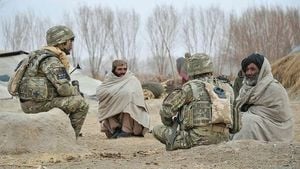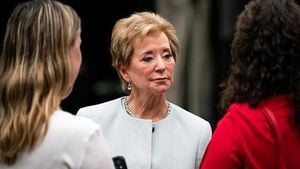In the heart of Nigeria's Plateau State, a grave tragedy unfolded this past week, casting a somber shadow over the community of Jebbu Binde in the Ta-Hoss District of Riyom Local Government Area. On Monday, July 14, 2025, gunmen, suspected to be Fulani militia, launched a brutal attack on the village, resulting in the deaths of over 30 people, including women and children. This violent assault has not only devastated families but has also ignited a fierce response from state leadership and renewed calls for urgent security reforms.
The scale and ferocity of the attack were chilling. According to local authorities and eyewitness accounts, the assailants were armed with guns and machetes, showing no hesitation even in the presence of security personnel stationed a few kilometers away. Graphic videos and photographs circulated widely on social media, depicting charred homes and lifeless bodies strewn across the village, a haunting testament to the violence that transpired.
State assembly member Dewan Gabriel described the situation as increasingly alarming, emphasizing that the rising attacks in Riyom Local Government Area have generated a pervasive sense of fear and insecurity among residents. "The rising attacks in Riyom Local Government Area have become alarming, creating a state of fear and insecurity that must be addressed urgently," Gabriel stated, underscoring the urgent need for more effective measures to protect vulnerable communities.
Local official Sati Shuwa, responsible for the area, painted a grim picture of the attack's audacity. He noted that the attackers were undeterred by the presence of security forces, brazenly burning houses during their raid. "The assailants, armed with guns and machetes, were undeterred by the presence of security personnel as they burned down houses during the raid," Shuwa said, highlighting a critical failure in the security apparatus to prevent such carnage.
Governor Caleb Manasseh Mutfwang of Plateau State visited the affected village on Wednesday, July 16, 2025, to assess the damage and offer condolences. During his visit, he delivered a stern rebuke to the security agencies, condemning their lapses and demanding accountability. "Sadly, we got intelligence for this attack, yet the attack still happened. I’m calling on the security agencies to redouble their efforts; we need to reappraise our strategy and tactics," Mutfwang declared. His words reflect a growing frustration with the seeming impunity of armed groups who continue to terrorize communities despite prior warnings and security deployments.
The governor was unequivocal in his condemnation of the attackers, whom he referred to as "unknown gunmen," a term that has been widely used in Nigeria to describe perpetrators of such violent acts whose identities remain officially unconfirmed. However, Mutfwang made it clear that this era of ambiguity must end. "How can people come and attack people and kill them in their homes, and we say they are not known? The perpetrators of the act must be arrested; the era of unknown gunmen is over," he asserted. He further reminded security forces of their fundamental duty: "You are not here for peacekeeping; you are here to defend the lives and property of Nigerians. Anybody that is threatening the lives of Nigerians is an enemy of the state and must be dealt with accordingly." His statement signals a call for more proactive and decisive security operations.
These attacks are not isolated incidents but part of a broader, deeply entrenched conflict that has plagued Nigeria’s northern and central regions for years. The violence largely stems from clashes between local herders and farmers over scarce resources such as land and water. Over time, these disputes have escalated, with more herdsmen reportedly taking up arms, leading to a deadly cycle of retaliation and insecurity. The conflict’s intensity has worsened in recent years, as evidenced by the staggering death tolls in similar attacks, including a massacre last month in neighboring Benue State where at least 150 people were killed.
Despite ongoing efforts by the government and security agencies, the persistence and frequency of these attacks suggest that current strategies are insufficient. Dewan Gabriel acknowledged the efforts made but stressed the necessity for new tactics to effectively address the crisis. "He acknowledged the efforts of the government and security agencies, but called for a change in tactics to tackle the situation effectively," reports indicate, reflecting a consensus that innovative and robust approaches are urgently needed.
The Plateau State government has pledged to support survivors and victims’ families, signaling a commitment to humanitarian assistance alongside security reforms. Governor Mutfwang’s visit to Jebbu Binde was not only a gesture of solidarity but also a call to action, emphasizing that the safety and well-being of citizens must be paramount. His administration’s promise to overhaul security strategies aims to prevent future tragedies and restore a sense of normalcy to communities living under constant threat.
However, the challenges are immense. Security forces must contend with difficult terrain, limited resources, and the complex socio-political dynamics fueling the violence. Moreover, the term "unknown gunmen" has often been criticized for obscuring the true identities and motives of attackers, complicating efforts to bring perpetrators to justice. Governor Mutfwang’s insistence on ending this ambiguity marks a significant shift towards accountability and transparency.
As the nation grapples with this ongoing violence, the situation in Plateau State serves as a stark reminder of the urgent need for comprehensive peacebuilding initiatives. Addressing the root causes of conflict—such as resource scarcity, ethnic tensions, and economic marginalization—will be essential to breaking the cycle of violence. Meanwhile, immediate security measures must be strengthened to protect vulnerable communities from further attacks.
The recent events in Jebbu Binde and the wider Riyom Local Government Area underscore a critical juncture for Nigeria’s security policy. The government’s response, led by Governor Mutfwang’s resolute stance, will be closely watched by citizens yearning for peace and stability. It remains to be seen whether these commitments will translate into tangible improvements on the ground, but one thing is clear: the era of tolerating violence under the guise of "unknown gunmen" is coming to an end.




